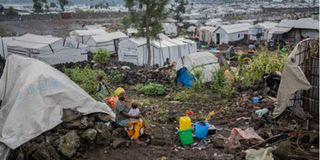Premium
Africa must reject imposition of sanctions: Lessons from the DRC

Congolese people displaced following recent clashes between the M23 rebels and the Armed Forces of the Democratic Republic of the Congo (FARDC), leave the camps and return to their homes after the M23 rebels instructed them to vacate the camps in the outskirts of Goma, Democratic Republic of the Congo February 12, 2025.
An analysis of the conflict in Eastern Democratic Republic of Congo (DRC) and M23’s military successes will show that the conflict has entered a more destabilising and dangerous phase.
According to International Rescue Committee, the DRC is facing one of the world’s most severe humanitarian crises following decades of conflicts and mass displacement of over seven million people, including 2.8 million in North Kivu, the epicentre of the current conflict.
After the capture of Goma and Bukavu, M23 has established control of both North and South Kivu, with some interesting developments emerging. First is the unprecedented speed at which M23 captured territory.
Second is the group establishing administrative and governance structures in both North and South Kivu. Third is the absorption of surrendered DRC soldiers, which means the group will face less resistance and get stronger as the conflict progresses.
Then there’s the groups resolve to march to Kinshasa in pursuit of regime change. In such a scenario, one needs to consider whether it is necessary for DRC to engage in a costly war or seek alternative means to pursue a peaceful outcome.
It is in DRC’s interest to adopt a more diplomatic and measured approach towards all actors in the conflict, including Rwanda and M23, as opposed to maintaining a rigid stance that poses a fundamental risk to the nation’s stability and survival.
A significant turning point and opportunity to de-escalate tensions in the region and pursue peaceful options was offered by the trilateral meeting held in Doha on March 18.
The meeting hosted by His Highness Sheikh Tamim bin Hamad Al Thani and attended by the presidents of Rwanda and the DRC, welcomed the progress made in the Luanda and Nairobi processes and the joint EAC-SADC Summit.
The heads of state reaffirmed the commitment of all parties to an immediate and unconditional ceasefire and to continue the discussions initiated in Doha to establish solid foundations for lasting peace.
These developments are taking place at a time when the decisions of the African Union and the EAC-SADC Summit had seemingly failed to yield tangible results.
Doha’s informal meeting, therefore, offers unique opportunity for EAC, SADC and AU to heighten and conduct robust diplomatic engagements, including the use of the African Peace and Security Architecture mechanism.
As the search for peace in DRC and the region is pursued, it is important to maintain a delicate balance that considers the deep-rooted causes of the conflict and builds trust and confidence between the parties.
Towards this end, punitive approaches such as terming some actors aggressors, branding others as terrorists and sanctioning of states or individuals must be rejected by all stakeholders as they compromise dialogue and prevent progress.
Unfortunately, in response to allegations that Rwanda backs M23, international actors have opted to impose punitive measures instead of fostering inclusive dialogue.
The UN Security Council adopted Resolution 2773 on February 21 demanding Rwanda withdraw its troops and ceases support for M23.
The United Kingdom suspended £40 million in annual aid and is considering further sanctions, while America imposed sanctions on Rwanda’s Minister of State for Regional integration.
The European Union called for freezing of direct budget support to Rwanda and is reconsidering its strategic minerals agreement, while Germany suspended new development aid.
There is need for the reversal of these sanctions for a variety of reasons. First, the punitive approaches are unproductive as they ignore complex historical and regional dynamics, while singling out Rwanda and individuals in M23 for sanctions, which may hinder peace efforts. It is not surprising that M23 pulled out of the last round of talks planned for Luanda due to sanctions.
Secondly, sanctions are perceived to be targeting mostly the African continent. A study by Singapore Management University confirms that UN Security Council sanctions are imposed mostly in Africa with “43 (68%) of the 63 UNSC sanctions applied against African states”.
This situation must be of concern to Africa, and calls for continental unity against such oppressive approaches. It calls for rejection, with a common voice, of all forms of sanctions on a particular country in Africa.
History has shown us that sanctions, instead of resolving conflicts, worsen the already dire situation by causing more instability and possible collapse of the state. Clear examples include Libya, Sudan, Somalia and Zimbabwe, where sanctions have had disastrous consequences with enduring negative effects.
There is need to foster non-coercive approaches that can work best for Africa’s scenario, using homegrown workable philosophies that can be used to solve our challenges and promote peaceful coexistence. Africa is one, it is interconnected and we must bear collective responsibility.
The DRC conflict offers opportunity to draw lessons but also serves as a critical test for African leadership and its commitment to resolve continental challenges innovatively in a manner that works in the African context.
Lieutenant-General (Rtd) Adan Mulata is the executive chairman of Prospect Peace Initiative, an African peace thin-tank




